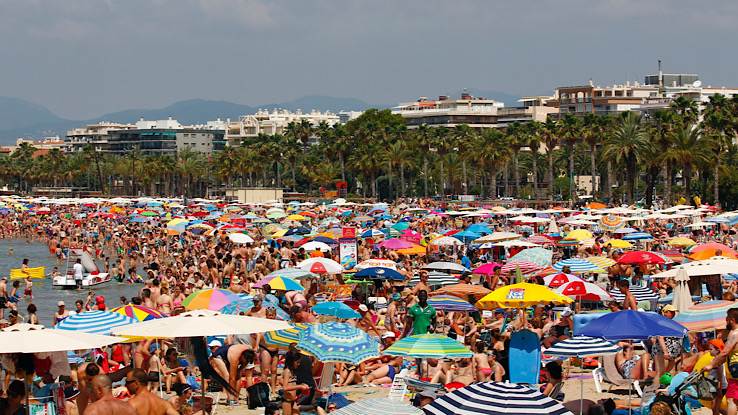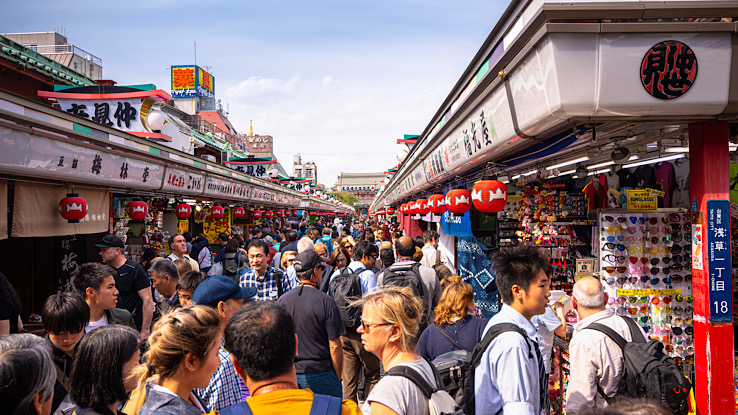
My family would go to Yosemite every summer when I was growing up. It was always a return to nature: crowded, sure, but it had clean air and abundant wildlife, and it was easy to get around the park. I finally got back there recently, and things sure had changed. There was a thick layer of smog in the Valley, throngs of visitors along the river and on the trails, and so many people lined up to get on the bus that we had no choice but to walk everywhere (I didn’t mind that last part, but it wasn’t very efficient). So, what happened? One word: overtourism.
What Is Overtourism?
Traveling to exciting new places has always been a draw, but when too many people want to visit a specific city or landmark, you have a recipe for overtourism. The definition varies, but it’s likely overtourism if a place experiences adverse effects from visitors, such as overcrowding, higher rents for locals because of short-term vacation rentals, and damage to land and resources. Various locations can accommodate diverse numbers of tourists, and what is overtourism to one person may look different to another.
Why is Overtourism Happening?
The reasons for overtourism are both simple and complex. The number of tourists is almost guaranteed to increase every year (at least until COVID-19 hit) from 25 million international tourists in 1950 to 1.4 billion in 2018. Plus, the industry thrives on maximizing profits. More people live on Earth than ever before and want to explore their planet.
Travel is booming, particularly as the pandemic ends. People were confined to their homes, researching their dream destinations – and now they have their moment. National parks like Arches and Yellowstone are simply overrun with tourists, distinctive attractions in cities are overwhelmed, and there seems to be no end in sight. Airbnb, VRBO, and other vacation rental demands can drive up prices and push residents out of the market. Many travel-related companies suffered a lot during COVID lockdowns and now offer affordable flights, cruises, and packages to attract customers, boosting tourist numbers.
What is Affected By Overtourism?

Cities can meet tourism demands much easier than remote island destinations. However, every place has its limits. If you’ve tried to find a slice of sand to yourself in Hawaii recently, you’ve seen the effects (my favorite was “Secret Beach” on Kauai, which my partner and I had to ourselves years ago, but now had a hundred beachgoers). You’ll see the same idea with the Road to Hana, the Parthenon in Greece, the Eiffel Tower, and countless other tourist destinations.
Impacts of Overtourism
Some of the significant impacts of overtourism include:
- Environmental damage: Too many people can cause physical stress on the land and wildlife. People wander off trails, causing devastating effects on native plants, scaring animals, and increasing erosion rates. Some tourists vandalize nature, including carving initials in trees, littering, and even leaving graffiti in pristine areas. Yes, this can happen anytime, but it can be harder to enforce rules when there are large crowds, and some individuals get carried away in herd mentalities.
- Harm to local communities: Overtourism can harm the quality of life of people who live in a specific place. Day after day of overcrowding, honking horns, and excessive commotion can lead to conflict between tourists and locals, who were used to a particular way of life before. It can also impact their finances, as rents, housing costs, restaurant prices, and parking fees go up due to overtourism. It reached a point in recent years that anti-tourism protests became a thing around the world.
- The quality of the experience suffers: The irony of overtourism is that it brings down the enjoyment level for the tourists themselves. Where there used to be peace and tranquility in national parks and cultural sites, there are often loud voices, blaring music, and traffic jams. After a multi-hour wait to get in, cultural treasures and iconic landmarks lose their luster.
- Prices go up for everyone: As demand increases, prices rise. Businesses in tourist-overloaded towns can charge more for goods and services because people will pay for them. For example, the famous Blue Lagoon in Iceland will cost you more than $80 just to bathe in its warm – but crowded – waters. Many parks and nature destinations now require reservations to get in, ride the shuttles, and even hike certain trails.
What Can You Do To Avoid Overtourism?
Fortunately, there are specific ways you can help the problem of overtourism, including following the principles of responsible tourism.
Often, there are clear alternatives to the most popular spots. For example, if you want to go to Thailand to see the emerald seas of Phuket. You may not want to overrun the local population, you can go to lesser-known parts of the country like Koh Samui or the southern beaches. You can even visit neighboring countries like Cambodia, the Philippines, or Laos.
Italy is a history and culture-rich destination, with a warm climate and stunning scenery. But guess what? So is Croatia, which is next door and offers a more affordable price tag and much less tourist-packed experience. Or, if you’re looking for an Indonesian paradise, try Lombok instead of Bali, where you can still escape the crowds and find peace.
If you are intent on visiting a destination on your bucket list, consider going in the off-season. The crowds are lighter, you will lessen your impact, prices are lower – and you will probably enjoy the place even more.
You can adjust your itinerary to explore less-touristy areas, discovering the authentic feel of the country you visit. Sometimes, a trip to a rural village can leave a much more lasting impression than the big-ticket items that everyone else visits.
What Organizations/Countries Are Doing to Stop Overtourism?
Since 2017, when tourism numbers peaked and overtourism became a well-known term, many organizations have tried to slow its effects.
- Reservation systems: Many national parks adopted a reservation system to keep numbers in check.
- Timed Entry: Museums like the Smithsonian and many landmarks often have a timed-entry system to maintain capacities.
- Policies: Groups like the Center for Responsible Travel (CREST) offer resources to improve cruise ship impacts, create policies for sustainable tourism, and show travelers how to minimize their climate change effects when they travel.
- Ticketing policies: Peru has new ticketing policies to reduce visitors to Machu Picchu. Amsterdam has eliminated specific tours and stopped advertising, and Venice has implemented day-use fees for visitors.
Hopefully, more countries and organizations will follow suit, and overtourism can reverse in the future.






